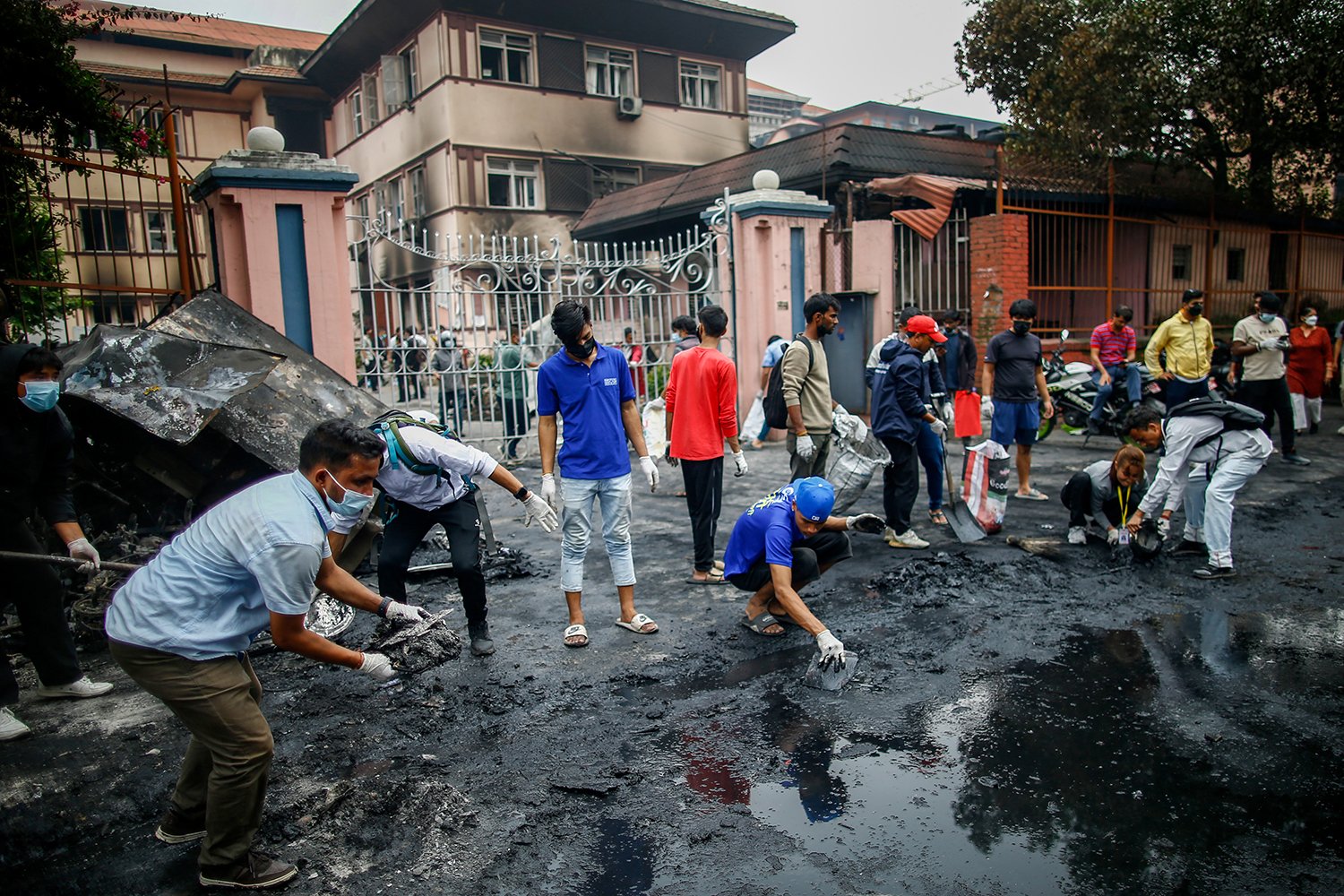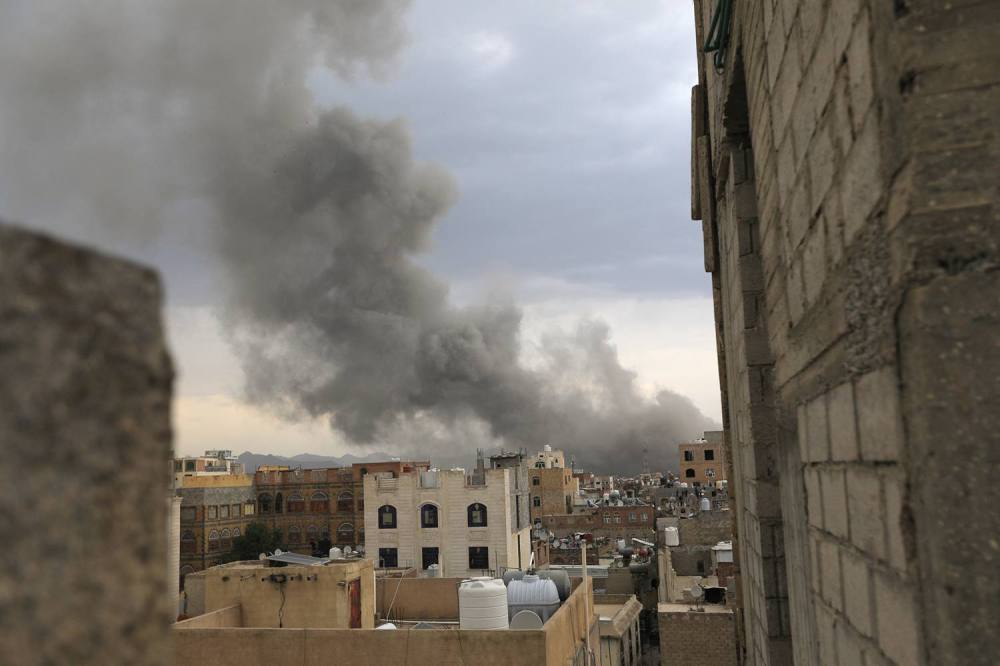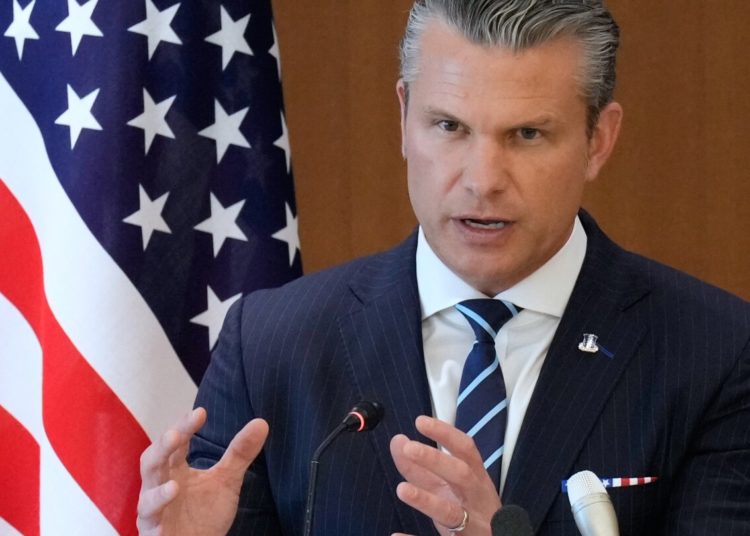Welcome back to Foreign Policy’s Situation Report. We want to begin this week’s edition with an important message in light of right-wing activist Charlie Kirk’s killing in Utah on Wednesday. Kirk once sat down with John for a lengthy interview. Though he didn’t appreciate all of John’s questions and wasn’t afraid to make that known, he still engaged with John on a range of tough topics. We have to be able to discuss difficult issues without the threat of violence. Civil discourse is vital to democracy. On that note, thanks for reading SitRep and engaging with us.
Here’s what’s on tap for the day: Israel’s expanding regional war, a U.S.-China military video call, and U.S. biker gang members distributing aid in Gaza.
Israel’s Regional War
Throughout the Israel-Hamas war in Gaza, which has fueled tensions across the Middle East, concerns have been raised about the potential for a regional conflict to break out. But in many ways, this is already the reality in the Middle East. And the list of countries Israel has bombed grew this week with a strike in Doha, Qatar, that marked a major escalation in Israel’s war against Hamas.
Since the Hamas-led attack on Oct. 7, 2023, Israel has conducted military and clandestine operations in multiple countries across the Middle East in addition to Gaza, including Iran, Lebanon, Yemen, Syria, and Qatar. The Israeli military has also been extremely active in the occupied West Bank since Oct. 7, conducting ground and air operations amid a sharp rise in settler violence against Palestinians. The Israeli attacks around the region have ranged from assassinations—including a stunning operation involving exploding pagers in Lebanon—to broader military campaigns aimed at debilitating its adversaries’ capabilities.
Israel has effectively acknowledged that it’s waging war across the region. “In recent days, we have struck in several arenas simultaneously,” Israel Defense Forces (IDF) chief Lt. Gen. Eyal Zamir said on Wednesday. “Our message is clear: The long arm of the IDF will reach every arena and sever the hands of all our enemies in the Middle East.”
Though Israel’s operations have killed many top leaders of its biggest enemies and left their forces greatly diminished, its actions have also been condemned by many around the world. But the Israeli government continues to operate in a way that suggests it’s not especially concerned with global opinion. The country’s conduct also suggests that Israel believes that the United States will continue to support it no matter what, even when it behaves in a way that undermines Washington’s foreign-policy goals.
“Right now, we may be subject to a little bit of criticism. They’ll get over it. And Israel is being changed for the better,” Yechiel Leiter, Israel’s ambassador to the United States, told Fox News on Tuesday.
Here’s a quick rundown of the places beyond Gaza and the West Bank that Israel has bombed or fought in since Oct. 7.
Iran. Israel and Iran have exchanged fire multiple times since Oct. 7, but the most intense fighting occurred over the course of 12 days in June. That month, Israel launched Operation Rising Lion, targeting key nuclear and military sites across Iran. In the process, Israel killed a number of top military leaders and nuclear scientists. A cease-fire brokered by the United States (which also got involved and bombed Iran) has since held, but tensions remain high.
Lebanon. Israel and the Iran-backed militant group Hezbollah began routinely exchanging fire almost immediately after Oct. 7. Then, roughly a year ago, Israel launched a ground invasion of Lebanon. A cease-fire was eventually reached in November 2024, but Israel has still not withdrawn its forces from southern Lebanon and has continued to strike targets within the country—including as recently as this week.
Yemen. Not long after Oct. 7, the Iran-backed Houthi rebels in Yemen began firing missiles and drones at Israeli targets—and targeting Israeli-linked shipping vessels in the Red Sea. The Houthis said their actions were in support of Palestinians in Gaza. Israel has responded with strikes in Yemen, including this week. In August, an Israeli strike killed the prime minister of the Houthi-led government in Yemen, Ahmed al-Rahawi.
Syria. Following the collapse of Bashar al-Assad’s regime last year, the Israeli military conducted strikes in Syria to destroy the government’s remaining military assets. The Israeli military also sent troops into parts of Syria and has continued to conduct airstrikes in the country. In July, Israel bombed Syrian forces as they moved to intervene in sectarian clashes in the southern Syrian city of Suweyda. The Israeli government said it was protecting the Druze, a religious minority that also has a significant population in Israel.
Qatar. Israel conducted a strike in Doha on Tuesday. The operation targeted Hamas leaders as they gathered to discuss a Gaza cease-fire proposal. Hamas said its leaders survived the attack but that five lower-ranking members, including the son of Khalil al-Hayya, the group’s lead negotiator, and a Qatari official were killed. The Israeli strike—its first known in Qatar—was fiercely condemned by Doha and other Arab capitals. The Trump administration was also critical, stating that the attack “does not advance Israel or America’s goals.”
Let’s Get Personnel
The United Kingdom has fired its ambassador to Washington, Peter Mandelson, over his alleged close ties to Jeffrey Epstein, the millionaire financier and convicted sex offender who died in prison in 2019. In a statement on Thursday, the U.K. Foreign Office said it took the decision following the recent release of emails that Mandelson wrote to Epstein in the early 2000s. “The emails show that the depth and extent of Peter Mandelson’s relationship with Jeffrey Epstein is materially different from that known at the time of his appointment,” the statement said.
In one of those emails, which were obtained by Bloomberg News, Mandelson expressed support for Epstein even as he reported to jail in 2008 to begin serving time for soliciting sex from a minor, writing: “I think the world of you and I feel hopeless and furious about what has happened.” He also urged Epstein to “fight for early release.”
On the Button
What should be high on your radar, if it isn’t already.
Hegseth talks to China. U.S. Defense Secretary Pete Hegseth spoke to Chinese Defense Minister Dong Jun via videoconference on Tuesday in their first conversation since Hegseth took charge of the department. According to a readout from the Pentagon, Hegseth “made clear that the United States does not seek conflict with China nor is it pursuing regime change or strangulation of the PRC [People’s Republic of China],” a statement that appeared to stand out to several China watchers in Washington as being overtly reassuring to Beijing.
The Chinese readout of the meeting followed more well-trodden ground, with Dong warning Hegseth that any attempts to use Taiwan to contain China are “doomed to fail” and that “acts of containment or deterrence against China will not succeed.”
U.S. biker gang in Gaza. Several members of a U.S. biker gang with a documented history of Islamophobia and calls for violence against Muslims have been part of security teams at aid sites in Gaza, according to a BBC investigation published Wednesday. At least 10 members of the Infidels Motorcycle Club—including its leader, Johnny Mulford—were hired by security contractor UG Solutions to work at aid sites run by the Gaza Humanitarian Foundation (GHF), a controversial organization backed by Israel and the United States to oversee aid distribution in the territory, the BBC found. (Mulford’s involvement was first reported by Zeteo in August.)
In a statement shared with SitRep, the GHF said it “maintains a strict zero-tolerance policy toward any form of hateful or discriminatory behavior.” Mulford “has not been involved with GHF since August, and we are actively reviewing additional allegations.” UG Solutions did not immediately respond to a request for comment.
Poland corrals NATO over Russian drones. Poland has officially activated Article 4 of the North Atlantic Treaty, Prime Minister Donald Tusk confirmed on Wednesday, after the Polish military shot down multiple Russian drones in Polish airspace.
Article 4 provides a mechanism for any NATO member to start consultations among the alliance’s leadership on a specific issue, with the possibility—but not obligation—for collective action. It’s broader but less escalatory than the more famous Article 5, which states that an attack on one member of the alliance is treated as an attack on all of them. Poland’s invocation of Article 4 this week is the eighth time a country has done so in NATO’s history.
Snapshot

Hot Mic
Department of Defense or Department of War? Although U.S. President Donald Trump signed an executive order last week to change the department’s name from the former to the latter, there’s still a little bit of an adjustment period—as evidenced by the programming at the Billington CyberSecurity Summit in Washington, where Rishi spent much of this week reporting. The titles of speakers from the Pentagon or its myriad subagencies were changed from DoD to DoW, which a conference representative told SitRep was done at the “request of DoD to reflect the name change.”
Several of those speakers either slipped up, used the names and acronyms interchangeably, or joked about it, all of which prompted scattered chuckles from the audience throughout the conference. On one Wednesday afternoon panel, John Garstka, the Pentagon’s director for cyberwarfare, joked that he had “war” in his title “before it was cool.” His co-panelist, Stacy Bostjanick, the department’s chief of defense industrial base cybersecurity, followed that up in her introduction with: “Defense industrial base, I guess now known as the war industrial base.”
For the name change to be official (and legal), though, Congress will have to pass legislation.
Put On Your Radar
Friday, Sept. 12: Sentencing is expected in the Brazilian Supreme Court’s conviction of former President Jair Bolsonaro.
Monday, Sept. 15, to Saturday, Sept. 20: Syria holds its first elections since the fall of Assad.
Wednesday, Sept. 17: Trump is scheduled to make a state visit to the United Kingdom.
Quote of the Week
“Our nation is broken.”
—Utah Gov. Spencer Cox, speaking after the shooting of Kirk about political violence in the United States.
This Week’s Most Read
- The End of Development by Adam Tooze
- China’s Military Is Now Leading by Sam Roggeveen
- Putin’s Fear of a Humiliating Economic Crisis by Agathe Demarais
The post Israel’s Regional War appeared first on Foreign Policy.




